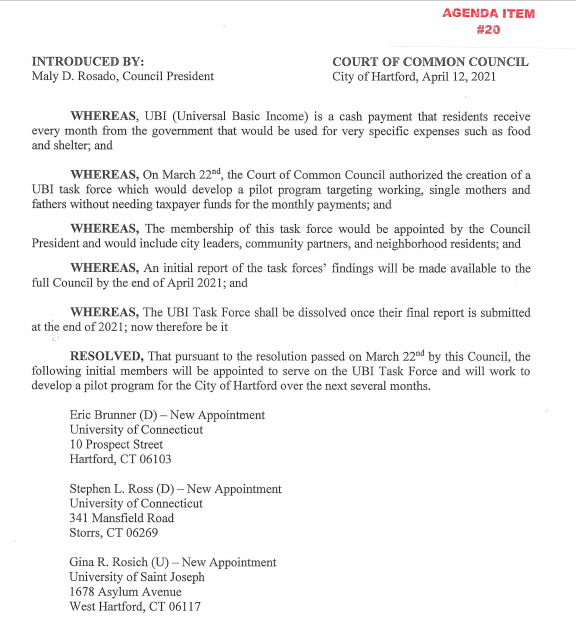
The City of Hartford’s Court of Common Council voted in March to create a task force to assess the possibility of a universal basic income pilot program for some of its residents. The task force will study the issue and report their findings to the city council.
The initial resolution put forward in February cited the COVID-19 pandemic; other UBI pilot programs in cities like Stockton, California; national lawmakers from both sides of the political aisle who have supported a UBI, and a Roosevelt Institute study that found a national UBI would create $4.6 million jobs.
During a March 15 meeting of the Hartford Operations, Management, Budget & Government Accountability Committee, David Grant, executive assistant to City Council President Maly D. Rosado, shared a presentation on UBI and stressed that the resolution was merely to form a task force to study the viability of a UBI in Hartford.
“The task force is going to be put together to understand what the needs of our city are and whether a program like this would be beneficial,” Grant said.
The task force would identify a funding strategy for the program and “Develop a structure to include benchmarks, application process, administrative support, program management, oversight, etc.,” according to the presentation.
The presentation highlighted Alaska’s annual stipend to residents from its mineral royalties, a program instituted by the Eastern Band of Cherokee Indians in North Carolina, and a recent pilot program out of Stockton that gave $500 per month to 125 residents who earn less than the state’s median income.
Grant’s presentation showed the UBI in Stockton went primarily to general living expenses, such as groceries, clothing and transportation costs like gas.
“Right now, we’ve got Indiana, North Carolina and Louisiana being the most recent states who have committed to a UBI pilot program in select cities,” Grant said.
Although the task force has yet to be formed and start its work, Grant said they were looking at a possible pilot program of 50 single mothers or fathers receiving $500 per month for a total cost of $150,000. Grant said they are not looking to use taxpayer money to fund the program but would rather look to existing revenue streams and possibly applying for funding grants.
The task force would develop criteria to select pilot program participants.
Councilwoman Wildaliz Bermudez raised the possibility of using cannabis tax revenue if Connecticut moves forward with legalizing recreational marijuana.
Gov. Ned Lamont’s budget proposal includes using cannabis tax revenue to help support payments to cities for tax-exempt properties and allowing municipalities to levy a local excise tax on cannabis sales.
A cannabis equity bill passed by the Labor and Public Employees Committee would allow a maximum three percent local excise tax on cannabis sales in a given municipality.
Grant said these questions are probably best left to the expert panel and noted the final details of the cannabis bill – and whether or not is passes – is still up in the air. Other possible funding sources include philanthropic grants.
“I do think there is a desire from organizations in Hartford to support something like this, but we need to be able to provide a full proposal on what we expect, what the results from other programs have been and what type of sustainability plan we can create from the initial data that’s collected through the pilot,” Grant said.
A Universal Basic Income has become a more public discussion in recent years, being put forward by 2020 presidential candidates like Hawaii Representative Tulsi Gabbard and Andrew Yang, who is currently running for mayor of New York City.
The preliminary analysis by the Stockton Economic Empowerment Demonstration was released this past March.
Overall, the report found Stockton’s UBI provided more financial stability to participants, enabled them to have more “self-determination, choice, goal-setting and risk taking” and found that the percentage of participants with full-time work increased from 28 percent to 40 percent over the course of a year.
But researchers cautioned that “guaranteed income is not a cure all for the consistent, market-driven obstacles that prevent many American households from achieving stability and health.”
However, UBI programs are not without their critics who say the UBI could disincentivize work and be altogether too costly for governments to maintain, and some UBI experiments in the past have not panned out as well as Stockton’s.
One of the largest UBI experiments in the world in Finland did not go as planned, possibly due to how the experiment was designed – namely, reducing other welfare payments for those receiving the guaranteed income – but there were cost concerns as well.
A similar massive UBI experiment in Ontario suffered from similar problems and results, ultimately leading to its cancellation.
Hartford appears poised to move forward with the task force, according to the Hartford City Council’s April 12 agenda.
The Council will vote on appointing three experts to the UBI Task Force: Professor of Economics and Policy Eric Brunner and Professor of Economics Stephen L. Ross, both of the University of Connecticut, along with Assistant Professor of Social Work Gina R. Rosich of the University of Saint Joseph.
The task force will submit their report and recommendations at the end of 2021.
**Meghan Portfolio contributed to this article**
